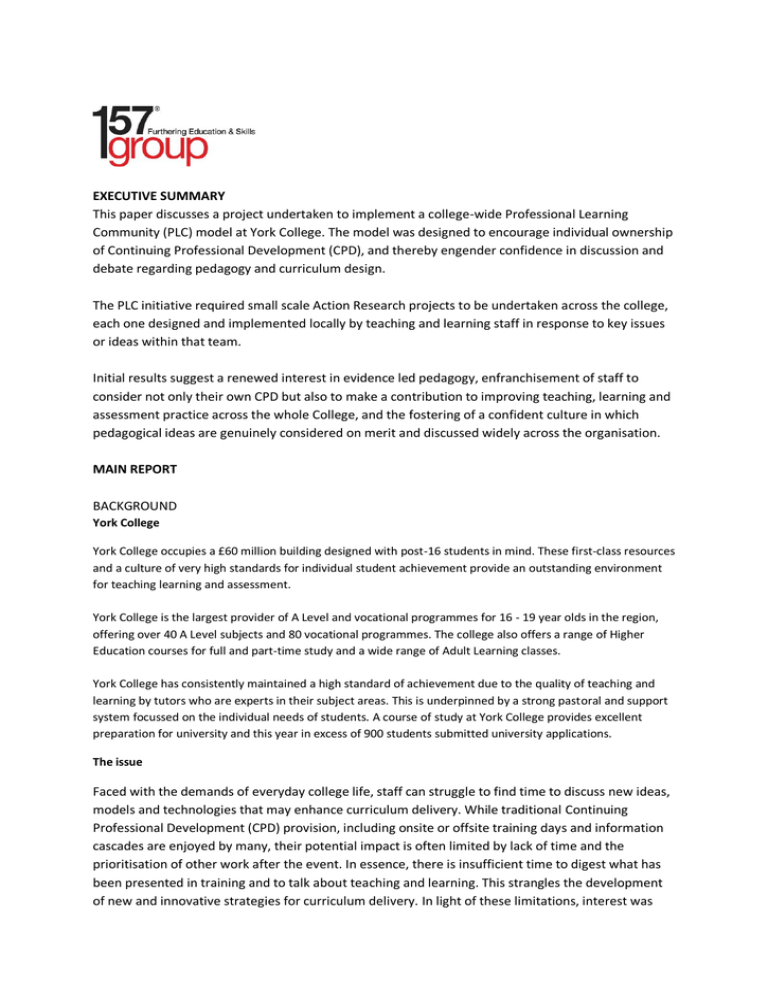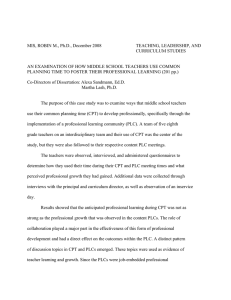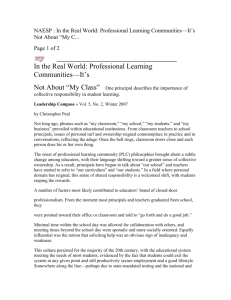EXECUTIVE SUMMARY This paper discusses a project undertaken
advertisement

EXECUTIVE SUMMARY This paper discusses a project undertaken to implement a college-wide Professional Learning Community (PLC) model at York College. The model was designed to encourage individual ownership of Continuing Professional Development (CPD), and thereby engender confidence in discussion and debate regarding pedagogy and curriculum design. The PLC initiative required small scale Action Research projects to be undertaken across the college, each one designed and implemented locally by teaching and learning staff in response to key issues or ideas within that team. Initial results suggest a renewed interest in evidence led pedagogy, enfranchisement of staff to consider not only their own CPD but also to make a contribution to improving teaching, learning and assessment practice across the whole College, and the fostering of a confident culture in which pedagogical ideas are genuinely considered on merit and discussed widely across the organisation. MAIN REPORT BACKGROUND York College York College occupies a £60 million building designed with post-16 students in mind. These first-class resources and a culture of very high standards for individual student achievement provide an outstanding environment for teaching learning and assessment. York College is the largest provider of A Level and vocational programmes for 16 - 19 year olds in the region, offering over 40 A Level subjects and 80 vocational programmes. The college also offers a range of Higher Education courses for full and part-time study and a wide range of Adult Learning classes. York College has consistently maintained a high standard of achievement due to the quality of teaching and learning by tutors who are experts in their subject areas. This is underpinned by a strong pastoral and support system focussed on the individual needs of students. A course of study at York College provides excellent preparation for university and this year in excess of 900 students submitted university applications. The issue Faced with the demands of everyday college life, staff can struggle to find time to discuss new ideas, models and technologies that may enhance curriculum delivery. While traditional Continuing Professional Development (CPD) provision, including onsite or offsite training days and information cascades are enjoyed by many, their potential impact is often limited by lack of time and the prioritisation of other work after the event. In essence, there is insufficient time to digest what has been presented in training and to talk about teaching and learning. This strangles the development of new and innovative strategies for curriculum delivery. In light of these limitations, interest was generated in the creation of a new model that required active engagement by staff in the CPD of themselves and their close colleagues. The project The project aimed to develop a sense of community amongst staff, to promote discussion and debate of teaching and learning issues and, with specific training and dedicated focus on small group projects, to raise staff confidence to levels that allowed them to experiment with curriculum design and delivery. Each of the small group projects was carefully managed as part of a college-wide exercise to establish Professional Learning Communities (PLCs) with an underpinning theme of Assessment for Learning. PROJECT INTERVENTIONS Developing and implementing a York College model for Professional Learning Communities (PLC). Completed Oct 2012. Staff development sessions held during the summer of 2012 helped to familiarise staff with the concept of PLCs starting with a presentation by Professor Frank Coffield. The York College model was then developed by the Head of Division (HoD) Education, Training and Learning Development and the Quality Improvement (QI) Manager, based upon research cited by Frank Coffield, John Hattie and Dylan Wiliam and in consultation with HoDs and others on the College Management Team. PLCs were initiated as a whole College activity in October 2012. Traditional staff meetings have a tendency to be dominated by the distractions of day to day operational matters. The York College PLC model operated on a divisional (departmental) basis, in which time was allocated specifically for teams to focus purely on issues of teaching, learning and assessment practice. The allocation of time, and the regularity of meetings was set locally to allow for the most effective arrangements. In addition to team time, two half days on whole College training days were set aside for the PLCs to meet. Agreeing individual project proposals from teams. A key outcome of the PLC initiative was the development of a suite of individual project proposals. A formal project submission process was designed to add weight and rigor to PLCs as a whole College initiative, and following a process of divisional and Quality Improvement review, all proposals submitted by divisional teams were approved by SMT. A diverse array of more than 20 projects were completed including: Promotion of an engagement and participation culture (Business, Hospitality & Travel) Development of a simple and effective mobile video analysis tool for tutor-tutor, tutorstudent and student-student review of activity (Education Training & Learning Development) Student feedback: improvement of the opportunities for students to give specific feedback on their experience of teaching and learning (Engineering) Joint Peer Observation between two Divisions (English and Maths) Attendance at classes as a student to visualise the student experience (IT & Computing) Training Heads of Division in the use of Assessment for Learning. Research by Dylan Wiliam (Wiliam, 2011) suggests that Assessment for Learning (AfL) is a crucial component of effective teaching and learning, and this has been reflected in a number of AfL related discussions and project proposals within PLCs. Initial training in the use of AfL, using the Wiliam model was presented as part of staff training for HoDs in October 2012, and cascaded to teams via Divisional PLCs. Senior Tutors were tasked with helping HoDs develop AfL practices, and this work is ongoing. AfL now forms a significant component of the York College Way and has been incorporated directly into a number of PLC projects. Dedicating Senior Tutor time to supporting the PLC initiative. Senior Tutors (STs) were tasked with helping HoDs develop divisional PLCs, and this work is ongoing. STs have played an important role in developing College wide strategies for peer observation and review. The culture of PLCs lends itself very well to opening up the classroom, sharing ideas and best practice and developing confidence in peer support. Collating interim project data Divisions were allocated a half day of training time for the development and implementation of individual projects, and required to submit interim project reports to QI and the College Senior Management Team for College-wide circulation. Final reports are due in time for presentation at the summer 2013 staff Training and Development Conference. PROJECT OUTCOMES AND NEXT STEPS Assessing the impact of the project on increasing staff confidence to discuss teaching, learning and curriculum design. The time allocated to PLCs has revived interest in pedagogy. The process has enfranchised staff to consider not only their own CPD but also to make a contribution to improving teaching, learning and assessment practice across the whole College. It has helped foster a culture in which ideas are considered on merit. The York PLC model allows ideas to flow both ways through the College hierarchy. It has therefore prepared the ground for staff to engage with the challenges inherent in Curriculum Redesign. Assessing the impact of the project on student engagement due to the increased pedagogical experimentation by staff. A series of interviews and focus groups are planned in order to assess student engagement. A key factor in the success of the design and implementation phases of these projects was the improvement in intra- and inter-team communication achieved through PLCs. A series of interviews and focus groups are planned in order to gauge tutor confidence and willingness to engage with alternative curriculum strategies. The emphasis will be on qualitative assessment rather than quantitative measures. The investment of time and resource in the Professional Learning Communities has brought about a significant change in the culture of College CPD, away from measurement and logging of hours in favour of genuine individual and team development and ownership of CPD. The model was highly successful in promoting pedagogical discussion within and between teams. College management bought into the initiative, by agreeing to make PLCs a core component of the annual CPD programme. PLCs are now regarded as an important contribution to excellence in teaching, learning and assessment and have earned a place in the redefined York College Way document (York College, 2012) and our Good to Great (York College, 2011) College professional development strategy. We anticipate that the results of the PLC project will be a more responsive body of staff, with an improved capacity to handle the challenges ahead. Going forward, the College plans to collate PLC projects and to host a teaching and learning conference in summer 2013, at which teams will present their PLC outcomes and consequent plans for the future. References Coffield, F. & Williamson, B., (2011). From Exam Factories to Communities of Discovery. London: Institute of Education. Hattie, J., (2011). Visible learning for teachers: maximising impact on learning. London: Routledge. Wiliam, D., (2011). Embedded Formative Assessment. :Solution Tree Press. York College, (2011). Good to Great, York: York College. York College, (2012). The York College Way, York: York College.






